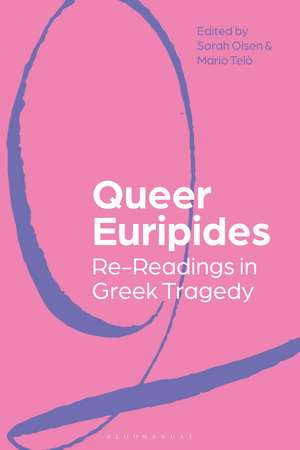Queer Euripides: Re-Readings in Greek Tragedy
Editat de Dr Sarah Olsen, Professor Mario Telòen Limba Engleză Paperback – 4 mai 2022
| Toate formatele și edițiile | Preț | Express |
|---|---|---|
| Paperback (1) | 178.88 lei 3-5 săpt. | +54.85 lei 4-10 zile |
| Bloomsbury Publishing – 4 mai 2022 | 178.88 lei 3-5 săpt. | +54.85 lei 4-10 zile |
| Hardback (1) | 499.33 lei 6-8 săpt. | |
| Bloomsbury Publishing – 4 mai 2022 | 499.33 lei 6-8 săpt. |
Preț: 178.88 lei
Preț vechi: 204.03 lei
-12% Nou
Puncte Express: 268
Preț estimativ în valută:
34.23€ • 35.36$ • 28.49£
34.23€ • 35.36$ • 28.49£
Carte disponibilă
Livrare economică 04-18 martie
Livrare express 15-21 februarie pentru 64.84 lei
Preluare comenzi: 021 569.72.76
Specificații
ISBN-13: 9781350249615
ISBN-10: 1350249610
Pagini: 288
Dimensiuni: 156 x 234 x 19 mm
Greutate: 0.68 kg
Editura: Bloomsbury Publishing
Colecția Bloomsbury Academic
Locul publicării:London, United Kingdom
ISBN-10: 1350249610
Pagini: 288
Dimensiuni: 156 x 234 x 19 mm
Greutate: 0.68 kg
Editura: Bloomsbury Publishing
Colecția Bloomsbury Academic
Locul publicării:London, United Kingdom
Caracteristici
Suggests new ways of reconceiving scholarly writing by bringing together a series of short, provocative essays on the threshold between traditional critique and post-critique, which privileges the notions of affect, feeling and mood in criticism
Notă biografică
Sarah Olsen is Assistant Professor of Classics at Williams College, USA. Mario Telò is Professor of Classics and Critical Theory at the University of California, Berkeley, USA.
Cuprins
List of FiguresList of ContributorsAcknowledgments Queer Euripides: An Introduction (Sarah Olsen, Williams College, USA and Mario Telò, University of California, Berkeley, USA) Part I. Temporalities1. Hippolytus: Euripides and Queer Theory at the Fin de Siècle and Now (Daniel Orrells, King's College, London, UK) 2. Rhesus: Tragic Wilderness in Queer Time (Oliver Baldwin, University of Reading, UK)3. Trojan Women: No Futures (Carla Freccero, University of California, Santa Cruz, USA) Part II. Escape/Refusal4. Iphigenia in Aulis: Perhaps (Not) (Ella Haselswerdt, University of California, Los Angeles, USA)5. Helen: Queering the Barbarian (Patrice Rankine, University of Richmond, USA)6. Children of Heracles: Queer Kinship: Profit, Vivisection, Kitsch (Ben Radcliffe, University of North Carolina, Greensboro, USA)7. Suppliant Women: Adrastus's Cute Lesbianism: Labor Irony Adhesion (Mario Telò, University of California, Berkeley, USA)Part III: Failure8. Medea: Failure and the Queer Escape (Sarah Nooter, University of Chicago, USA) 9. Alcestis: Impossible Performance (Sean Gurd, University of Missouri, USA)10. Ion: Into the Queer Ionisphere (Kirk Ormand, Oberlin College, USA) Part IV: Relations 11. Heracles: Homosexual Panic and Irresponsible Reading (Alastair Blanshard, University of Queensland, Australia)12. Andromache: Catfight in Phthia (Sarah Olsen, Williams College, USA)13. Orestes: Polymorphously Per-verse: On Queer Metrology (David Youd, University of California, Berkeley, USA) Part V. Reproduction14. Hecuba: The Dead Child or Queer for a Day (Karen Bassi, University of California, Santa Cruz, USA)15. Phoenician Women: "Deviant" Thebans Out of Time (Rosa Andújar, Kings' College, London, UK)16. Electra: Parapoetics and Paraontology (Melissa Mueller, University of Massachusetts at Amherst, USA)Part VI: Encounters 17. Iphigenia in Tauris: Iphigenia and Artemis? Reading Queer/Performing Queer (Nancy Sorkin Rabinowitz, Hamilton College, USA and David Bullen, Royal Holloway, UK)18. Cyclops: A Philosopher Walks into a Satyr Play (Daniel Boyarin, University of California, Berkeley, USA) Part VII: Transitions 19. Hippolytus: Queer Crossings: Following Anne Carson (Jonathan Goldberg, Emory University, USA)20. Aristophanes' Women at the Thesmophoria: Reality and the Egg: An Oviparody of Euripides (L. Deihr, UC, Berkeley, USA)21. Bacchae: "An Excessively High Price to Pay for Being Reluctant to Emerge from the Closet?" (Isabel Ruffell, University of Glasgow, UK) Notes Bibliography Index
Recenzii
Reading Queer Euripides from start to finish feels like receiving an invitation to a conversation, a collective, an in-crowd, a protest, a manifesto for change ... I feel deeply grateful to the editors of Queer Euripides and to its contributors for this volume that in its reckoning with the failures of Classics is no less full to the brim with 'weedy hope'. I am trying to imagine the landscapes that will grow from such endings.
The surprise factors of these re-readings ... will constantly challenge our assumptions and force us to read the text with fresh eyes.
Full of innovative analyses of Euripides' plays, this ground-breaking volume is the first to employ queerness as a lens for examining the entire surviving corpus of an ancient Greek playwright. In both form and content it heralds a new approach to ancient texts that should have a deep impact on the field of Classics and reach many audiences beyond it.
The surprise factors of these re-readings ... will constantly challenge our assumptions and force us to read the text with fresh eyes.
Full of innovative analyses of Euripides' plays, this ground-breaking volume is the first to employ queerness as a lens for examining the entire surviving corpus of an ancient Greek playwright. In both form and content it heralds a new approach to ancient texts that should have a deep impact on the field of Classics and reach many audiences beyond it.
